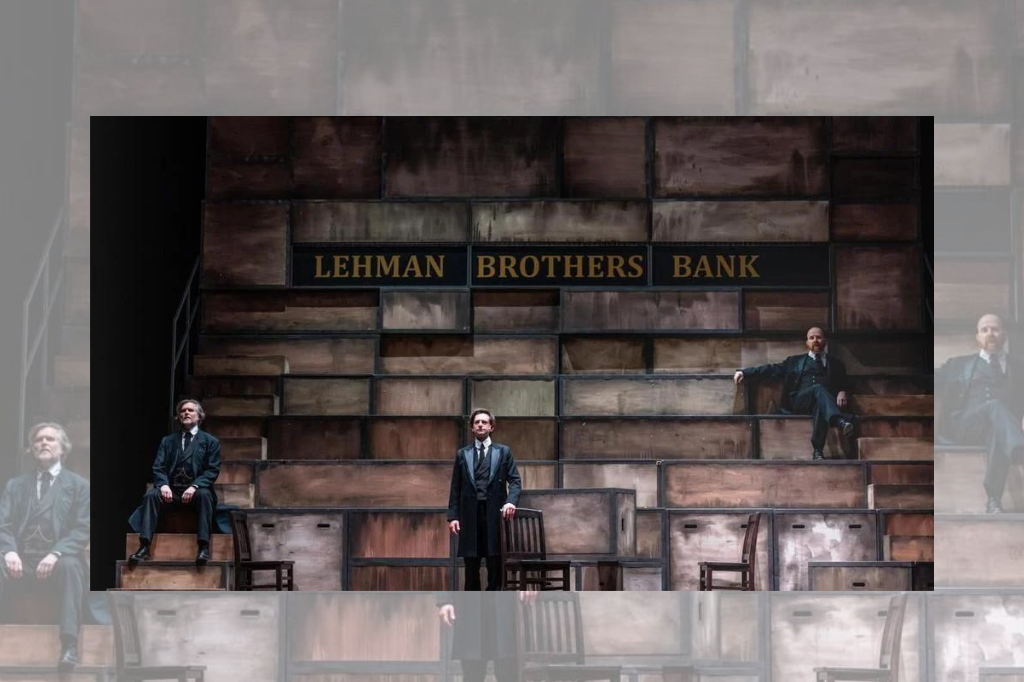REVIEW: The Lehman Trilogy is a major win for Canadian Stage
This continent is one held up by dynasties.
I mean, take your pick: the Bushes of American politics, the Sacklers of Purdue Pharma, or perhaps more locally, the Sahotas of Vancouver slums. While the American Dream might be predicated on the myth of individualism, it’s only kept alive for long stretches of history when that individual procreates and thus expands their empire.
So it goes with the Lehman brothers.
The Lehman Trilogy, presented by Canadian Stage in a luminous production at the Bluma Appel Theatre, theatricalizes the family often erroneously blamed for the 2008 financial crisis. Starting in the 19th century, Stefano Massini’s play, as adapted by Ben Power and directed by Philip Akin, traces the Lehmans from their first steps off the boat from Germany until their ultimately tragic downfall. A sprawling work, the production unfurls over three hours and with two intermissions, using three knockout actors to portray several generations’ worth of Lehmans.
In his recent Intermission Spotlight, Akin hinted at a design element in The Lehman Trilogy that would scream from the stage. (He brought it up again when I interviewed him for CP24.) And oof, what an element it is. Camellia Koo’s set resembles a set of risers or bleachers, with movable blocks and very steep stairs that serve as a playground for the Lehmans as they assemble (and destroy) their various companies on their climb to unthinkable wealth. But holding those steps up is a thin platform of human feet, their soles facing out towards the audience and their toes pointed to the actors above them, always visible and always a gut punch of raw symbolism in a play that in the wrong hands could be bogged down in financial history. These are the feet of the slaves who picked the cotton the Lehmans would eventually convert into fabric; the feet of the Lehmans’ rotting ancestors; the feet of the Indigenous communities crushed by European settlers; the feet of the swathes of lower classes breaking under capitalism’s relentless thrust forward. Akin’s right to have bragged about the impact of those feet – they’re quite a presence.
But it’s perhaps the more vital feet (and the actors attached to them) who make The Lehman Trilogy in all its heft feel so engaging and at times, even funny. Ben Carlson is Henry, commanding and shrewd, in a performance that echoes The Master Plan, in which Carlson’s character also slipped into the politics of society’s upper echelon. Graeme Somerville plays Emmanuel, the middle brother, the brawn of the Lehman kingdom. And Jordan Pettle is Mayer, often referred to as “the potato” of the Lehman family, its frequent comic relief. There’s a comparison to be made between the Lehmans as portrayed in this staging of their story and the members of the alternative rock band boygenius: in each there’s the soft one, the angry one, and the small one.
What’s brilliant in Akin’s production of The Lehman Trilogy is the extent to which it generalizes the atrocities of capitalism, and zooms out on American economics to shine a light on the bodies holding it up. One need not look far to see how Lehmanesque finances have reared their ugly heads in Toronto – the local housing market is evidence enough of that.
Perhaps my only qualm with the play is, well, the play. The first act of Massini’s text and Power’s adaptation focuses on the early years of the Lehman brothers; the second moves forward to the years leading up to the Great Depression; and the third covers… the tail end of that second timeframe, as well as a mad rush toward the Great Recession of the late 2000s. That’s a lot to squeeze in! It’s frustrating how solidly paced the first half of the play is, only for its back half to feel so incomplete and haphazard. Akin’s handling of this issue is mostly elegant, and where the text calls for it, he leans into the chaos, having his actors toss boxes, clamber up and down the stairs, and revel in practical stage effects I won’t spoil here. But still, it shows when the play itself begins to lose steam.
The Lehman Trilogy signifies one hell of a win for Canadian Stage, in a production I suspect will top many “best-of” lists next month. This is Akin at his A-game and a play whose message demands to be heard – and, in the case of those haunting feet, seen.
The Lehman Trilogy runs at the Bluma Appel Theatre until December 2. Tickets are available here.
Intermission reviews are independent and unrelated to Intermission’s partnered content. Learn more about Intermission’s partnership model here.














Comments